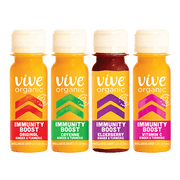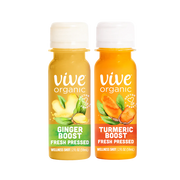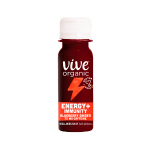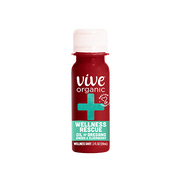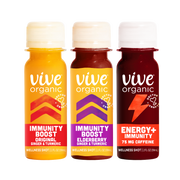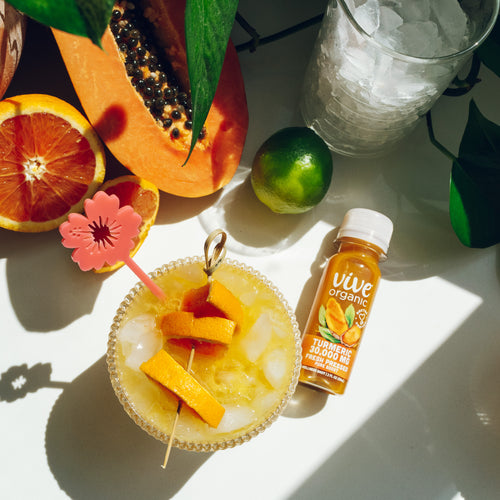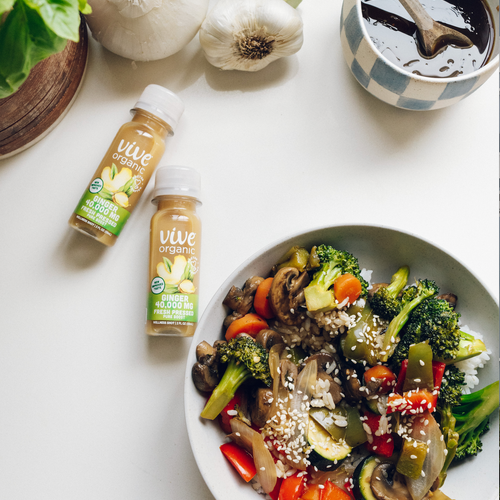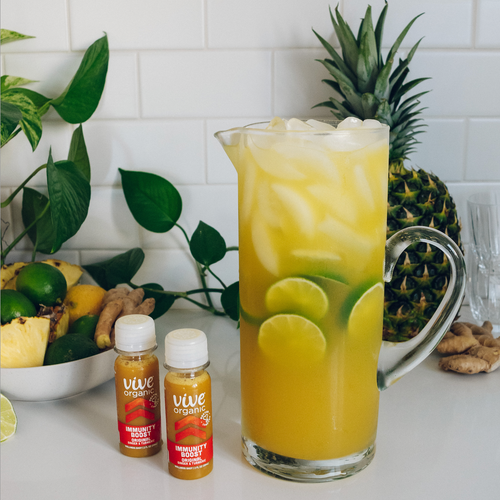Working out or just engaging in regular physical activity lifts your mood and supports your overall mental and physical health. Deciding what to eat and choosing the best pre-workout snack depends on you as well as the type of activity that you are doing.
In this blog, we focus on the importance of optimal nutrition and the best pre-workout snacks to help support your performance whether you are an athlete or just power walking around the neighborhood.
Nutrition 101 — The Right Balance
If you’re working out, you are most likely looking to strike that perfect balance between your activity and what you can do to enhance your performance. Fueling up is important to ensure that you have the right combination of macronutrients (often referred to as macros), which include carbohydrates, protein, and fat, as well as micronutrients like vitamins, minerals, and trace elements. What you eat, the amount, and when you have your pre-workout snack can help you to meet the demands of your physical activity.
A well-balanced nutrient rich diet that provides variety can ensure adequate calories and other essential nutrients. If you don’t consume enough calories throughout your day you will not have the energy needed to function properly for your day-to-day activities. Then adding exercise to the mix means you may need you need additional calories and other nutrients to sustain the increase in energy expenditure. Let’s discuss how these macronutrients and pre-workout snacks play a role in providing satiety, energy, supporting healthy blood glucose levels and delaying fatigue.
Meet the Macros and How They Support Your Workout
Carbohydrates
Carbohydrates are the fuel generators that support us throughout our day, but especially when we are exercising. They provide us with the fastest source of energy in comparison to protein or fat.1 The carbohydrates that we consume in our diets are used as needed by the body.
Carbohydrates help to raise your blood glucose levels when your levels start to drop. To ensure homeostatic or healthy blood glucose levels — avoiding the effects of hypoglycemia or low blood glucose levels, you need to ingest an adequate amount of carbohydrates before you engage in your physical activity.1,2,3 The amount of carbohydrates required is different for each of us; however, when the duration of exercise increases, so should your carbohydrate intake.
Glucose that isn’t used is stored in the liver and muscles as glycogen which can be tapped into when needed.1,3,4 The body relies on this glycogen reserve especially when you are engaged in a short bout of a high-intensity exercise.5
Bottom line — it’s crucial to replenish these stores not only before and after exercise, but to ensure that you are consuming a varied diet that provides some healthy carbohydrates like grains, fruits, and vegetables, as well as milk (which also contains some protein) throughout your day.
Protein
Getting enough protein in your daily diet is necessary to ensure ongoing synthesis and repair of your body’s tissues, organs, and muscles, as well as for supporting other key processes in the body.6
As you may recall, all proteins are made up of one or more amino acid chains and there are 20 types of amino acids. Nine of these amino acids are considered essential amino acids (EAAs) and can only be obtained from our diet. The other 11 amino acids are considered nonessential and are produced by our bodies.7,8 So where do we get our dietary protein from?
- Two main sources of protein in our diets include plant and animal-based foods.
- Animal-based protein is deemed high-quality protein because it contains all of the EAAs, whereas plant-based protein contains only some of the amino acids, making it an incomplete protein.7,8 Plant-based foods are still considered a healthy addition to your diet.
- Even though plant protein doesn’t rock all of the EAAs, you can actually combine 2 incomplete protein sources such as corn, vegetables, nuts, seeds, beans, and whole grains to get all 9 EAAs.8,9 For example, adding peanut butter or another nut butter to whole grain bread or toast makes a complementary combo!9 Hey—just another reason to eat a well-rounded diet to cover the bases!
When it comes to pre-workout snacks, there is data to support that consuming protein as well as protein coupled with carbohydrates before a workout, can help with muscle protein synthesis.10,11 The inclusion of protein in pre-workout snacks or mini meals has been shown to be helpful, especially in resistance exercise (planks, squats, leg raises, wall pushups — you get it).
Protein recommendations will vary based on the individual; however, you can always meet with a Registered Dietitian who can assess your specific needs and your exercise goals and customize the best pre-workout snacks for you.
Fat
Fat provides calories and is important for transporting fat-soluble vitamins in the body among other functions. But when it comes to the best pre-workout snacks, it may be wise to avoid foods that are high in dietary fat. Foods with a high fat content may upset your digestive tract, possibly causing some intolerance — the last thing you want to have to worry about when hitting the gym!
Fat stores in the body are another source for providing energy during exercise. Fat provides fuel during a longer exercise session that is low to moderate intensity such as cycling, swimming, running or brisk walking.12, 13
Hailing Hydration
Though not a macronutrient, optimal hydration is critical to keep your body temperature in check and head off dehydration. According to the American Council on Exercise (ACE), the following recommendations for proper hydrating around exercise should be considered:14
- Pre-workout: Drink 17 to 20 fluid ounces of water two to three hours before exercise and drink 8 ounces of fluid 20 to 30 minutes before exercise.
- During workout: Drink 7 to 10 ounces of fluid every 10 to 20 minutes during exercise.
- Post-workout: Drink an additional 8 ounces of fluid 30 minutes after exercise and drink 16 to 24 ounces of fluid for every pound of body weight lost during exercise.
We have discussed many facets of exercise, optimal hydration along with how nutrients play an integral role in fueling your performance, so now check out when it would be best to take a bite before we pack the best pre-workout snacks.
Timing It Right — For You
Though it seems like there’s a lot of information to digest, keep in mind that everyone has different needs, from the competitive athlete to anyone of us who exercise at home or at the local gym. So how can we be sure that what we eat coincides with the timing of our workout?
According to an article shared by the American Academy of Nutrition and Dietetics, eating before a workout may differ for an individual.15
- There are many factors that may impact when to eat pre-workout, so trialing your snacks before you hit the course or start your workout is recommended.15
- Working within a general 1-to-4-hour timeframe pre-workout may be worth exploring to see how this works for you.15
Some of the International Society of Sports Nutrition recommendations include:16, 17
- Having a high carbohydrate, moderate protein and low-fat snack 30-60 minutes before a workout if there isn’t much time between the snack and workout.
- A high-carbohydrate, high-protein, low-fat snack about 2-3 hours before your workout, if you’re working out later in the day and have already had a breakfast and lunch.
Healthy Pre-workout Snacks
Consider making a list of some of your favorite foods that you would like to rotate during the week to build out the best pre-workout snacks. Some ideas to share by dietitians below:15, 16
- 1 medium banana (about 30 grams of carbs)
- ½ cup-1 cup of oatmeal (15-30 grams of carbs)
- 1 medium pear (15 grams of carbs)
- 8 fluid ounces of 1% or less milk -even chocolate!
- A peanut butter and jam sandwich
- String cheese and crackers
- Greek yogurt with a side of your fav fruit
- Cooked oatmeal with low-fat milk and berries
- Apple and peanut or other nut butter and a sprinkle of chia seeds
- Handful of nuts and raisins (two parts raisins: one part nuts)
Simply Summarizing
As you can see there isn’t a one size that fits all prescription for one’s nutrient requirements, such as carbohydrates protein and fats. If you feel that there is a gap in your intake, consider speaking with your healthcare practitioner and a Registered Dietitian for guidance.
Time your best pre-workout snack according to your schedule, and be cognizant of the carbs, protein and fat you are ingesting before your workout.
Always check with your healthcare practitioner before you start any exercise program.
Stay hydrated around the clock.
Enjoy and stay positive!
Disclaimer: This blog contains promotional content about our products. The information provided in this blog is for educational and informational purposes only and should not be construed as medical advice. While the nutritional information and health tips shared here are based on published studies and expert insights, they should not replace advice and treatment from a healthcare professional. Always consult a qualified healthcare provider with any questions you may have regarding a medical condition or health objectives.
Citations
- Rothschild, Jeffrey A et al. “What Should I Eat before Exercise? Pre-Exercise Nutrition and the Response to Endurance Exercise: Current Prospective and Future Directions.” Nutrients vol. 12,11 3473. 12 Nov. 2020, doi:10.3390/nu12113473 https://www.ncbi.nlm.nih.gov/pmc/articles/PMC7696145/.
- Noakes, Timothy David. “What Is the Evidence That Dietary Macronutrient Composition Influences Exercise Performance? A Narrative Review.” Nutrients vol. 14,4 862. 18 Feb. 2022, doi:10.3390/nu14040862. https://www.ncbi.nlm.nih.gov/pmc/articles/PMC8875928/.
- “Post Meal Exercise May Lead to Transient Hypoglycemia Irrespective of Glycemic Status in Humans.” Frontiers in Endocrinology, vol. 11, Sept. 2020, https://doi.org/10.3389/fendo.2020.00578.
- Lim, Meng Thiam et al. “Animal Protein versus Plant Protein in Supporting Lean Mass and Muscle Strength: A Systematic Review and Meta-Analysis of Randomized Controlled Trials.” Nutrients vol. 13,2 661. 18 Feb. 2021, doi:10.3390/nu13020661.
- Alghannam, Abdullah F et al. “Regulation of Energy Substrate Metabolism in Endurance Exercise.” International journal of environmental research and public health vol. 18,9 4963. 7 May. 2021, doi:10.3390/ijerph18094963.
- Adhikari, Shiksha et al. “Protein Quality in Perspective: A Review of Protein Quality Metrics and Their Applications.” Nutrients vol. 14,5 947. 23 Feb. 2022, doi:10.3390/nu14050947. https://www.ncbi.nlm.nih.gov/pmc/articles/PMC8912699/.
- Lopez, Michael J. “Biochemistry, Essential Amino Acids.” StatPearls [Internet]., U.S. National Library of Medicine, Updated 30 Apr. 2024, https://www.ncbi.nlm.nih.gov/books/NBK557845/.
- RDN, Kristi Wempen. “Assessing Protein Needs for Performance.” Mayo Clinic Health System, 22 Mar. 2024, https://www.mayoclinichealthsystem.org/hometown-health/speaking-of-health/assessing-protein-needs-for-performance. (Accessed 10 June 2024).
- Staff, Asn. “Protein Complementation.” American Society for Nutrition, 7 Aug. 2019, https://nutrition.org/protein-complementation. (Accessed 10 June 2024).
- Jäger, Ralf et al. “International Society of Sports Nutrition Position Stand: protein and exercise.” Journal of the International Society of Sports Nutrition vol. 14 20. 20 Jun. 2017, doi:10.1186/s12970-017-0177-8.
- Cintineo, Harry P et al. “Effects of Protein Supplementation on Performance and Recovery in Resistance and Endurance Training.” Frontiers in nutrition vol. 5 83. 11 Sep. 2018, doi:10.3389/fnut.2018.00083.
- Muscella, Antonella, et al. “The Regulation of Fat Metabolism During Aerobic Exercise.” Biomolecules, vol. 10, no. 12, Dec. 2020, p. 1699. https://doi.org/10.3390/biom10121699.
- Lindberg, Sara. “What Is LISS Cardio and Is It Right for You?” Healthline, 3 Oct. 2019, https://www.healthline.com/health/exercise-fitness/liss-cardio. (Accessed 10 June 2024).
- How Hydration Affects Performance. 29 Apr. 2015, https://www.acefitness.org/resources/pros/expert-articles/5397/how-hydration-affects-performance/. (Accessed 10 June 2024).
- Mohr, Christopher R. Timing Your Pre and Post Workout Nutrition. https://www.eatright.org/fitness/physical-activity/exercise-nutrition/timing-your-pre-and-post-workout-nutrition.
- Kerksick, Chad M et al. “International society of sports nutrition position stand: nutrient timing.” Journal of the International Society of Sports Nutrition vol. 14 33. 29 Aug. 2017, doi:10.1186/s12970-017-0189-4. https://www.ncbi.nlm.nih.gov/pmc/articles/PMC5596471/. (Accessed 10 June 2024).
- RD, Jill Corleone. “Pre-Workout Snacks for Endurance and Resistance Training, Recommended by a Dietitian.” Verywell Fit, 1 June 2022, https://www.verywellfit.com/pre-workout-meals-and-snacks-4135417#citation-10. (Accessed 10 June 2024).
